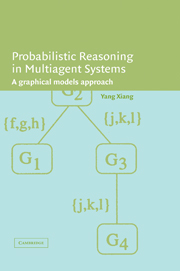Book contents
- Frontmatter
- Contents
- Preface
- 1 Introduction
- 2 Bayesian Networks
- 3 Belief Updating and Cluster Graphs
- 4 Junction Tree Representation
- 5 Belief Updating with Junction Trees
- 6 Multiply Sectioned Bayesian Networks
- 7 Linked Junction Forests
- 8 Distributed Multiagent Inference
- 9 Model Construction and Verification
- 10 Looking into the Future
- Bibliography
- Index
10 - Looking into the Future
Published online by Cambridge University Press: 31 August 2009
- Frontmatter
- Contents
- Preface
- 1 Introduction
- 2 Bayesian Networks
- 3 Belief Updating and Cluster Graphs
- 4 Junction Tree Representation
- 5 Belief Updating with Junction Trees
- 6 Multiply Sectioned Bayesian Networks
- 7 Linked Junction Forests
- 8 Distributed Multiagent Inference
- 9 Model Construction and Verification
- 10 Looking into the Future
- Bibliography
- Index
Summary
In Chapters 6 through 9, we studied in detail why a set of agents over a large and complex domain should be organized into an MSBN and how. We studied how they can perform probabilistic reasoning exactly, effectively, and distributively. In this chapter, we discuss other important issues that have not yet been addressed but will merit research effort in the near future.
Multiagent Reasoning in Dynamic Domains
Practical problem domains can be static or dynamic. In a static domain, each domain variable takes a value from its space and will not change its value with time. Hence, at what instant in time an agent observes the variable makes no difference. On the other hand, in a dynamic domain, a variable may take different values from its space at different times. The temperature of a house changes after heating is turned on. The pressure of a sealed boiler at a chemical plant increases after the liquid inside boils. A patient suffers from a disease and recovers after the proper treatment. A device in a piece of equipment behaves normally until it wears out. Dynamic domains are more general, and a static domain can be viewed as a snapshot of a dynamic domain at a particular instant in time or within a time period in which the changes of variable values are ignorable.
A Bayesian network can be used to model static and dynamic domains.
- Type
- Chapter
- Information
- Probabilistic Reasoning in Multiagent SystemsA Graphical Models Approach, pp. 274 - 286Publisher: Cambridge University PressPrint publication year: 2002

